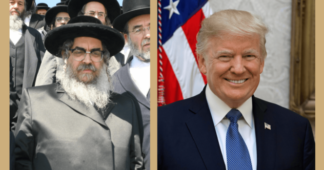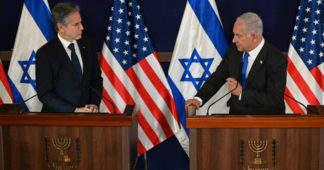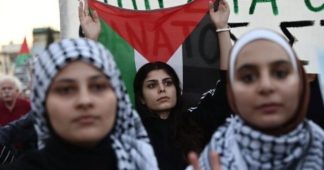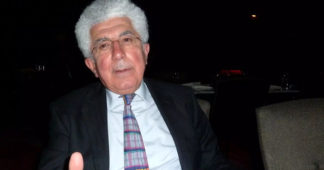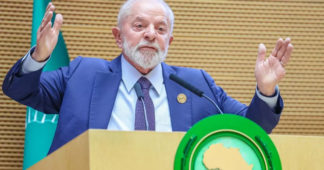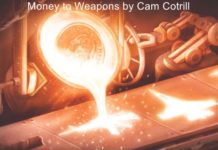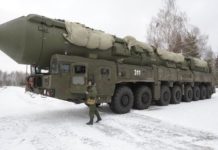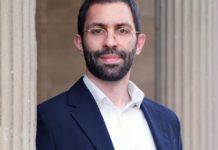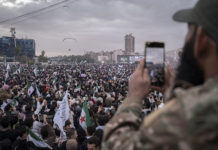Israel’s assault on Gaza has accelerated a move by many Jews in the diaspora towards anti-Zionism and pro-Palestinian activism
By Fleur Hargreaves
16 January 2025
Joel Samuels, a 38-year-old Jewish actor, writer and activist, says he believes a “reckoning” is taking place among Jewish communities in Britain.
“There is a reason the language around October 7 was linked to the Holocaust,” Samuels explains, referring to the Hamas attack in southern Israel that left more than 1,100 people dead.
“If you consistently root things in our major collective trauma… then the only solution and the only way we will be safe is by having this outpost of western imperialism.
“The abuse of the Holocaust… to keep us in fear to maintain Israel is not something that I think is understood by Jews.”
Samuels is one of a growing number of British Jews who have become increasingly disillusioned with Israel and the promise of Zionism, as well as increasingly involved in the pro-Palestinian movement.
Middle East Eye spoke to several Jewish activists about their journeys from Zionism, the importance of solidarity with Palestinians, and reclaiming a Jewish identity separate from Zionism.
Many “liberal Zionists” might “feel that the occupation is a moral stain on their conscience, but they can’t go beyond that,” said Samuels.
“For me… there is still apartheid enshrined into the nation state of Israel.”
Welcoming protests
Barnaby Raine, an academic and political commentator, argues that Zionism relied on a Jewish sense of “lacking safety”.
“Zionism is propelled where Jews do not feel safe or at home in the places they live,” he explained.
Fear has caused many to retreat into their communities and blind themselves to alternative viewpoints, branding them antisemitic.
Israel’s war on Gaza has so far killed more than 46,500 people – medical researchers this week said the figure is far higher – and has been accused of inflaming community tensions across much of the world, including the UK.
Although large numbers of Jewish people have taken part in the regular pro-Palestinian marches in London, some politicians and Jewish leaders claim they have made the Jewish community in the capital feel uncomfortable.
For Jonathan Rosenhead, the 86-year-old chair of the British Committee for the Universities of Palestine (BRICUP), despite media messaging cultivating fear that pro-Palestinian marches are dangerous to Jews, the opposite is true: he is welcomed in these protests and finds “it almost embarrassing the praise of people coming up to you”.
“We are not here as an act of generosity… it is a compulsion… because [Israel] claims to be doing it for Jews,” he said.
Zionism vs Judaism?
In the wake of World War Two and the Holocaust, the State of Israel and the Jewish project gained widespread support among Jews in the diaspora who saw it as a sanctuary for Jewish people fleeing European antisemitism and genocide.
Many of those who founded Israel identified as secular leftists – even anti-racists – and were involved with the Habonim Kibbutz movement, building utopian socialist communities in Israel.
But whatever their intentions, the Kibbutz movement was still built on a land that had been dispossessed of its people.
Over recent decades, as the expulsion and continuing repression of Palestinians has become more well-known internationally, some Jews who might have previously been sympathetic to Israel have increasingly turned to anti-Zionism.
Haim Bresheeth, a historian who grew up in Israel and founded the Jewish Network for Palestine (JNP), said there had never been a “good” Zionism, which was primarily about the conquest of Palestine.
He said that, for Jews, Zionism had “taken over” the religion and the community, and had “replaced the deity in the Jewish religion with the army and the state… replaced the values of the community… with the ideals of colonialism”.
“Zionism is anti-Jewish,” he added.
In addition, the conflation of the Jewish diaspora with the actions of Israel has helped stoke tensions, something which the Israeli government and other pro-Israel groups have capitalised on.
Samuels said while Jews did not “suffer” from Zionism like Palestinians do, they have been made to feel unsafe, and have been made unsafe, through efforts to equivocate Zionism and Judaism.
“If October 7 proved anything, it is that [Israel’s] understanding of where security and safety comes from is completely false – because, if Palestinians had rights, if Palestinians had freedom, those things don’t happen.”
“No group should have to suffer for another’s safety,” said Morris and Ada, members of Cambridge Jews for Justice (CJ4J), an organisation within their student encampment for Palestine.
“I don’t think a state that relies on military oppression is actually safe,” they added: “As long as there is any sort of societal hierarchy, everyone is in danger in some sort of way.”
‘Never again for everyone?’
For left-wing Jewish activists, Israel’s role as an outpost of western interests – primarily US interests – in the Middle East is another reason they are motivated to challenge the country.
Raine contended that, despite what is commonly thought, Israel was created not as a safe haven for Jews but for “imperial interests” in the region.
He cited outgoing US President Joe Biden’s admission that “Were there not an Israel, the United States of America would have to invent an Israel.”
This also chimes with the concerns many Jewish political campaigners had in the early 20th century that Zionism amounted essentially to a colonial project that would operate on behalf of the British Empire and other then-powerful empires.
The Holocaust drove a traumatised and despondent European Jewry to Zionism for salvation, while the slogan “Never again” became popularised in Israel not just in opposition to another Holocaust but as a statement of intent towards Israel’s enemies.
For Leah Levane, co-chair of Jewish Voice for Labour (JVL), it came down to whether the slogan meant “never again for Jews or is it never again for everyone?
“There is a trauma, and you can be brought up on victimhood – and that we are never going to be victims again,” Levane said.
Levane, growing up in Southall in London, was aware at an early age that comments her white neighbours made about Indian people, and the recent rhetoric around Muslims, were “what they used to say about us”.
“It is so extreme what Israel is doing – they have been doing so many terrible things for decades, with relative impunity – and what is happening now in Gaza is just so blatant and extreme… that only the most extreme people can support it,” she said.
Judaism after Zionism
The struggle over the relationship between Jewish identity, Judaism and Zionism has come with the backdrop of the bloodiest violence meted out against the Palestinians since 1948.
For student activists, protesting their universities’ and the UK government’s investment in the war on Gaza through direct action comes first and foremost.
But according to some Jewish activists, a side product has been a reimagining and re-centring of their Jewish lives.
Morris and Ada, members of Cambridge Jews for Justice (CJ4J) – an organisation within their student encampment for Palestine – said their activism for Gaza has gone alongside holding Torah study sessions, celebrating festivals and discussing their Jewish history within the encampment.
“Because it’s necessary for us to organise right now, a side product of that is exploring Jewish culture,” said Ada.
She said young Jewish people in particular were “determined to reclaim Judaism for ourselves because we see this attempt to take it out of our hands and turn it into this killing machine”.
For Morris and Ada, embracing their “diasporaism” is important: their identity as British Jews is not predicated on a settler-colonial state halfway across the world.
They explain engagement with the Jewish diaspora tradition is growing, through organisations such as the Diaspora Alliance.
For Raine, the movement is important first to Palestinian freedom, secondly as part of a broader anti-imperialist struggle – but also “to resuscitate Jewish life which has been so profoundly distorted by… the connection drawn insistently by western power for its own ends: between our people and a very violent colonial nationalism.
“Zionism participated in that antisemitic construal where the problem of antisemitism was seen not as a problem – as I would argue – of the antisemites, a problem of European society, but was instead a problem of Jews,” who “had to be changed”.
Israel’s attempts at constructing a “new Jew” helped destroy a 2000-year-old tradition which refused to have a nation or an army, he says.
Raine also said he located his activism within an “anti-colonial, left-wing Jewish” tradition which has existed for “as long as there’s been anti-colonialism and as long as there’s been a left”.
Despite the efforts of the Board of Deputies to act as representatives of the UK Jewish community as a whole, “the ability of those voices to speak for a supposedly homogenous Jewish community could be undermined by an emerging multiplicity of Jewish communities.
“Other forms of Jewish identity are on the rise… [including] people who are actually getting back in touch with a Jewishness that Zionism betrays.”
We remind our readers that publication of articles on our site does not mean that we agree with what is written. Our policy is to publish anything which we consider of interest, so as to assist our readers in forming their opinions. Sometimes we even publish articles with which we totally disagree, since we believe it is important for our readers to be informed on as wide a spectrum of views as possible.

